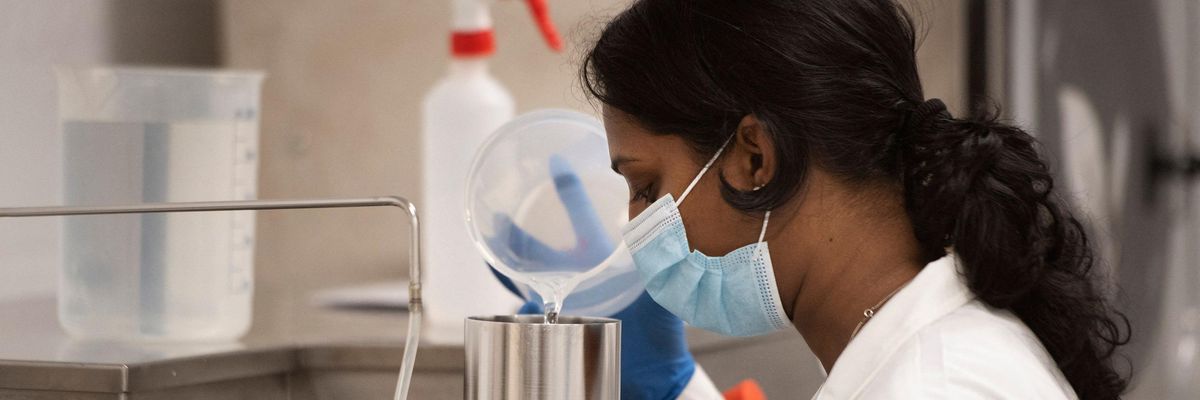U.S. government scientists on Friday agreed to share technical know-how related to the development of next-generation vaccines and treatments with their counterparts at Afrigen Biologics, a South African drug manufacturer that hosts the first mRNA technology transfer hub established by the World Health Organization and its partners.
"Failure to share technology... imposed a deadly injustice that much of the world will remember for generations."
The National Institutes of Allergy and Infectious Diseases (NIAID) pioneered the use of mRNA and its parent organization, the U.S. National Institutes of Health (NIH), co-invented Moderna's Covid-19 vaccine. Together, NIAID and Afrigen seek to expedite the production of mRNA vaccines--not only to combat the ongoing coronavirus pandemic but also to address other infectious diseases and cancer.
"The pursuit of effective vaccines for human diseases to improve public health is central to the mission of the NIAID Vaccine Research Center," Dr. Richard Koup, acting director of NIAID's VRC, said in a statement. "This collaboration allows us to exchange scientific expertise to further this mission and support Afrigen's globally important research and vaccine discovery efforts."
Zain Rizvi, research director of the Access to Medicines Program at Public Citizen, called the partnership "a big deal." It comes as drugmakers are testing updated Covid-19 vaccines tailored to Omicron and its increasingly evasive subvariants.
Peter Maybarduk, director of Public Citizen's Access to Medicines Program, also applauded the pact, which was announced ahead of a colloquium that brought together leading researchers from NIAID, Afrigen, WHO, and elsewhere.
"These are partnerships the world needs to sustain sharing of the latest science and technology, and to help give countries equitable access to the best medical tools," Maybarduk said in a statement. "Failure to share technology contributed to extreme shortages of Covid vaccines, tests, and treatments, and imposed a deadly injustice that much of the world will remember for generations."
Last April, as starkly unequal access to lifesaving jabs persisted amid a pandemic that has killed millions, WHO and its partners called for the establishment of at least one mRNA technology transfer hub to build capacity in low- and middle-income countries to produce doses locally. Two months later, the first consortium--based at Afrigen in Cape Town--was launched.
By February, scientists at the Afrigen hub were able to replicate the mRNA Covid-19 vaccine co-created by NIH and Moderna despite Big Pharma's best efforts to undermine their work. Instead of supporting the effort, Moderna filed multiple patents in South Africa--after withdrawing or abandoning equivalent ones in several other countries--thus creating legal risks that could jeopardize the hub's output for years to come.
Petro Terblanche, managing director of Afrigen, said Friday that her firm's collaboration with NIAID will enable the WHO-backed mRNA technology transfer hub to "fast-track the end-to-end Good Manufacturing Practices of the first clinical trial material of its Covid-19 vaccine candidate."
Maybarduk echoed Terblanche, saying: "NIAID's expertise and global reputation can help hub partners solve scientific challenges and draw further support from leading governments--and perhaps, eventually, from pharmaceutical corporations."
He also celebrated that researchers at NIAID will be joining "vaccine scientists of global reputation--inspired by and contributing to the hub program and learning from Covid mistakes to build a more equitable future."
As of April, 15 manufacturers in developing countries have been named as "spokes," or recipients of mRNA technology and training from the Afrigen hub. In addition, the WHO has teamed up with South Korea to create a global biomanufacturing teaching facility that will showcase best practices and complement specific trainings developed by researchers involved in the South African project.
Moving forward, "pharmaceutical corporations must provide deep technology transfer," said Maybarduk. "Leading governments must provide funding and logistical support to help establish a distributed network of global manufacturers."
"Scientists are leading the way," he added. "Perhaps political leaders will follow."




